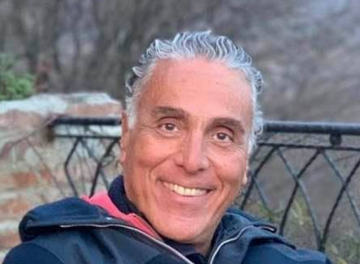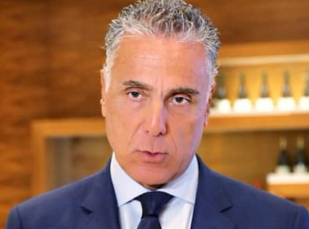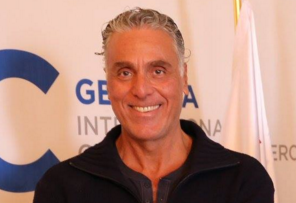 Is the business climate now getting any better? Do investors get adequate protection? Is it a good time to start business in Georgia?
Is the business climate now getting any better? Do investors get adequate protection? Is it a good time to start business in Georgia?
17.04.2019 (Caucasian Journal). Our today’s guest is Fady ASLY, Chairman of International Chamber of Commerce (ICC Georgia). Since its launch in 2002, ICC has been not only a top executives’ club, but often a shelter for mistreated businesspeople, where they could find an efficient support.
Caucasian Journal’s readers are the first to hear Mr. Asly’s answers.
Alexander KAFFKA, editor-in-chief of Caucasian Journal: Dear Fady, first of all, thank you for support to Caucasian Journal and attention to our growing readership. Though you are not Georgian, you are widely popular in this country. Many people know you as a leader of business associations, an entrepreneur, and even an original writer. But let us imagine you are facing an unfamiliar audience. How would you explain why you care so much about Georgia?
Fady ASLY: When I woke up early in the morning of April 28, 1998, hours after my first ever arrival to Georgia, I opened the balcony door of my hotel room and was taken aback by the beauty of the landscape, Mtatsminda’s amazing green hill with its small red-roofed mushroom houses under a clear and bright blue sky.
A cool breeze caressed my body and I was filled with internal peace and beatitude. As insane as it might sound, this is the moment I fell in love with Georgia! It was love at first sight and the start of a deep passion for this country, which has never left me for a single second despite all the adventures I had to go through over the years.
As a matter of fact, the happiest day of my life was the day in August 2007 when I was granted Georgian citizenship; I was overwhelmed with gratitude and pride and I cannot recall any other single moment in my life that made me happier.
I always felt that I was a Georgian at heart from my first days in the country! Being Georgian is not a legal status, it is a state of mind and a way of life! We do not choose the country or the family into which we are born, this is down to fate. But we do choose the partner whom we love and with whom we want to spend the rest of our life, and it goes the same when we adopt a country, especially when this country is Georgia.
AK: For how many years have you been in Georgia? How many presidents and prime ministers do you personally know?
FA: I have been in Georgia for 21 years now since that famous day of April 28, 1998 and for my 20 years heading a major business organization in the country. I can recall 4 presidents, but I cannot keep track of all the prime ministers and ministers with whom I had a working relation; I always jokingly say that I am the longest serving official in the country.
AK: You have survived the toughest periods in Georgia, and have been in the epicenter of business and politics during all the ups and downs of two recent decades. I understand that each cabinet gave you some reasons for criticism. None of them was perfect. But looking back, is there a period that you now may call “favourite”?
FA: Well, we had different challenges with the various administrations; during the Shevardnadze’s Administration our main worries were security concerns, corruption and securing a leveled playing field for foreign investors; during the Saakashvili’s Administration our concern was to stop harassment of businesses and attacks on businesspeople perceived to be close to Shevardnadze or to the opposition; now under the Ivanishvili’s Administration we have to deal unfortunately with the compounded challenges of both the Shevardnadze and the Saakashvili’s Administrations!
My favorite periods are the years 2006 and 2007 when the Saakashvili’s Administration had already gone through its learning curve and when businesses were left to develop their activities totally unhampered. This honeymoon period lasted till the August 2008 war with Russia.
AK: I guess after these answers our readers get a better idea of your experience and competence, and are looking forward to our opinion on the current situation in Georgia. Can you name, for instance, 3 main factors that characterize it today?
FA: The 3 main factors that characterize Georgia today from the business perspective are the following:
1 - A dichotomy in power, a hydra with two heads, where there are two sides running the country, on one hand an official but powerless side represented by the prime Minister and some of the government’ ministers and their teams, who understand how a country should be run and who work around the clock to promote Georgia, encourage foreign investment, fight poverty and improve the business environment, and on the other hand, an unofficial side that is the real power in the country, represented by Bidzina Ivanishvili and his entourage, who is pushing for his own and non-declared agenda, that consists of keeping foreign investors out of the country, spreading his tentacles over major businesses, getting rid of business people he dislikes using criminal methods reminiscent of the 1990’s, relying for that on all state structures that he totally controls, and in particular the Prosecutor's office, the Judiciary, and the law enforcers.
2 - A total lethargy of the authorities regarding the implementation of rule of law. Bidzina Ivanishvili came to power thanks to all the voters who were dissatisfied with the dictatorship governance style of Saakashvili; Ivanishvili understood the power of people, and he based his rule on the principle “Don’t upset anyone under any circumstances”! This means closing eyes on injustice and on the implementation of the rule of law in order not to upset potential voters. The problem with this approach is that when you want to please everyone you end up upsetting everyone, and this is what is happening now.
 3 - Collapse of the Judiciary, increase in corruption, nepotism and criminality; of course those factors are not conducive to a proper business environment.
3 - Collapse of the Judiciary, increase in corruption, nepotism and criminality; of course those factors are not conducive to a proper business environment.AK: I think everybody agrees that Georgia needs foreign investment to grow. How attractive is it in the investors’ eyes?
FA: Unfortunately, foreign direct investment [FDI] is stalling; the stories of many investors who were defrauded, harassed and prohibited from completing their investments are circulating all over the world now.
It takes one failure to destroy one hundred success stories; but when you have hundred failures and no success stories the problem becomes huge and unsolvable.
Unfortunately Georgia has lost its attractiveness for foreign investors; we have to keep in mind that Georgia has to compete for foreign investment with more than 120 emerging countries! Why would anyone come to Georgia and deal with harassment, pressure, lethargy of the authorities, and corruption in the judiciary, when they can go to more attractive destinations with better terms and investment conditions?
To add insult to injury we are witnessing a very serious xenophobic attitude of government against investors coming from certain countries such as the GCC [Gulf countries: Bahrain, Kuwait, Oman, Qatar, Saudi Arabia, UAE], India, Pakistan, Iran and even Turkey.
Based on all that no one should be surprised why FDI is plummeting!
AK: Following up to my previous question. Georgia’s rating in World Bank’s Doing Business index has gone up, jumping 3 positions to 6th place in the world. This is of course an outstanding achievement for a small post-Soviet country. According to index, doing business in Georgia must be similar to Norway and South Korea. If investors are hearing to it, they should be stranding in line to start a business here, but is that happening in reality? What else should be done to stimulate investing to Georgia?
FA: Without real political will to encourage FDI, without firm measures implemented by government to protect foreign investors and their businesses, FDI will not increase. We don’t feel this political will nor do we see actions on the ground to protect foreign investors.
As a matter of fact those past five years are the worst that I have seen when it comes to protection of foreign investors; honestly I don’t remember in the past 20 years - and this includes the Shevardnadze’s times - a period when so many foreign investors were under attack simultaneously; it is simply appalling and scary!
As for the World Bank Doing Business Report, we have stated our position already many times. This report benchmarks countries on the basis of ease of legislation, but the Report does not reflect at all the reality of doing business in a country; as a matter of fact it is a greatly misleading document, and we have officially informed the World Bank of our views regarding this matter.
A Report that doesn’t account for corruption, harassment, pressure, and the efficiency of the Judiciary cannot be a reliable document for any serious investor.
AK: Speaking about foreign investors, they always get many investment proposals, and have plenty of options to choose from. You run a consultancy firm, which probably works with potential investors, so you must have lots of insight in that field, too. How does Georgia perform in comparison to other countries, or at least in comparison to neighboring countries?
FA: On paper Georgia ranks very well and everything looks perfect, but reality is totally different. Let’s agree on one thing, foreign investors are looking to make money, they are looking for clear rules of the game, no hidden agendas.
If a country claims to be corruption free, then the investor expects a corruption free activity, and will not understand if at one stage, and once they are engaged in country, a government official asks for a share of their business to solve an artificially created problem.
If in another country you cannot operate without a local partner, this is just fine for the investor as long as everything is clear and settled before starting the operation. Therefore if the rules of the game are clear to an investor they will not mind those rules as long as they are predictable and stable.
If you compare Georgia to Azerbaijan or Armenia, on paper in Georgia you can do business without a partner, in Azerbaijan and Armenia you will need to partner with an influential government figure that will solve all possible problems when they arise.
In Georgia theoretically you don’t need a partner, however from experience I know that no investor can start a large project in the country if someone from government is not on board “unofficially” via a screen representative.
If the investors start their business without a local partner they will be harassed by various state structures, their business will never move smoothly and they will have to shut down their operation; this is a fact and a reality that I face everyday with investors, who come to us to complain; as a matter of fact ICC offices have turned into the Weeping Wall of Jerusalem with businesspeople coming by the score requesting our assistance.
Of course this is something that you will never read in the World Bank “Doing Business” report.
As far as our consultancy firm Channel Georgia Consulting, we have totally frozen our operation for Georgia since summer 2018, and we are diverting our investors to Eastern Europe and Central Asia. We don’t feel confident luring investors from the Middle East into Georgia at a time the government policies are simply xenophobic against investors from this part of the world.
So many investors from the GCC countries invested in Georgia and couldn’t even get a one-year residency!
Even worse, several of those investors were refused entry to Georgia after completing their investment, they were returned back on the same plane and prohibited from ever coming back, many of them had to leave their investments behind them. The message that government is sending out is: “We want your money but we don’t want you!”
At a time so many countries are luring investors with incredible packages, Georgia surely cannot afford such policies.
AK: Among ICC Georgia’s members there are both Georgian companies and international corporations. So you must hear many opinions about their day-to-day experiences and practices. Do you have an impression that foreign companies are receiving preferential treatment, or, in contrast, the national investors are given preference vis-à-vis the foreigners? What are the most typical complaints?
FA: During the Saakashvili’s Administration, foreign investors were very protected and given a preferential treatment, under the current Administration, as I have mentioned earlier, scores of foreign investors are facing problems; it is the same situation as well with many Georgian businesses, excluding of course the “privileged’ ones that are close to Mr. Ivanishvili.
One fact though, we have noticed that the Georgian courts have a tendency to favor domestic companies at the expense of foreign ones, and this is very worrying.
AK: You spare no time and effort to protect the Georgian companies when they are in trouble. You do not hesitate to report about wrongdoings directly to the top authorities. But what about the business community itself? Are companies prepared to defend collectively, or prefer to “wait and see” unless affected directly?
FA: Yes, we are very vocal when it comes to protecting and defending companies attacked by the authorities; as a matter of fact, we are the only “fearless” business organization in Georgia. We have learned over long years and from experience that the only times we were able to improve the business environment was when we had a bad relation with the government and never when we had a good relation - as paradoxical as this might sound.
Unfortunately this is a reality, government doesn’t trigger positive changes unless pressured or embarrassed publicly; we hate to do that, and we try to use all possible rational means with the authorities, however when everything fails then we go public.
Georgian businessmen are used to solve their problems silently and under the table, and this is the real problem that is feeding the corrupt system.
We believe that attacks on businesses have to be denounced publicly and put under the projectors, for under the lights the attackers loose their margin of maneuver and are paralyzed. This strategy worked every time we used it.






The business climate for European Investors has never been better. 🇪🇺
ReplyDeleteAs the letter to the Prime Minister referred to is presumably a parody or skit rather than a serious complaint, I reply in a similar lighthearted vein and as a European investor in Georgia speaking only for myself ✍️
No other business association, IFI or rating agency supports Fady Asly or ICC in saying that “foreign investors should not invest in Georgia”, because it is self evidently a ridiculous statement. No other business association in the World would make such a statement. It is akin to your doctor recommending you to start smoking 🚬 or to eat more fast food 🍔.
Since 2012 the signing of the DCFTI, the visa-free travel regime and massive legal reforms have increased standards across the board. There have been restrictions placed on tobacco companies and new safety standards. Of course some companies are not happy to see these standards introduced or for Georgia to start to export and trade more with Europe.
In Georgia we have a strong tradition of free speech, even people with no investments or record of successful business in Georgia can comment on the economy. Their position is of interest in a theoretical sense.
It is probable however that the World Bank, EBRD, Standard and Poor, Forbes and the actual businesses and investors in Georgia have a more relevant and balanced understanding of its potential than the author of this letter of the vanities. Are there problems? You bet there are, but less than most anywhere else and this is the reason why Georgia is so attractive right now to European Investors 🇪🇺
Georgia has started to export to Europe. Old cartels are facing competition. Many legacy 🦖 organisations are under pressure. Therefore noise is to be expected but the forecast is fair winds and a following sea. Bring sunglasses 🕶 Georgia 🇬🇪 is a buy 😎
This comment has been removed by a blog administrator.
ReplyDeleteI finally understood what's wrong with David Lee! He has an internally damaged GPS that situates him in Switzerland!
ReplyDelete🤷♂️